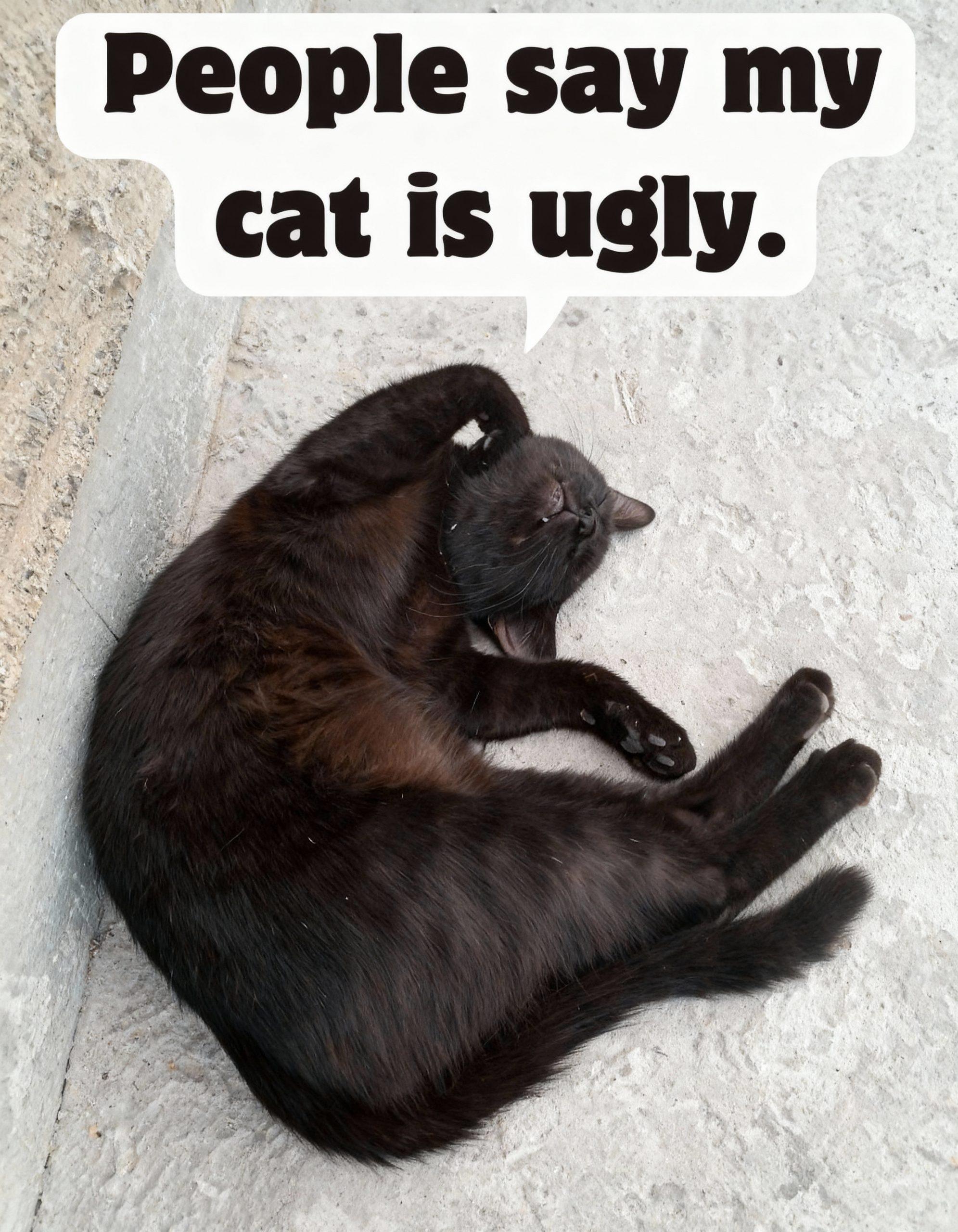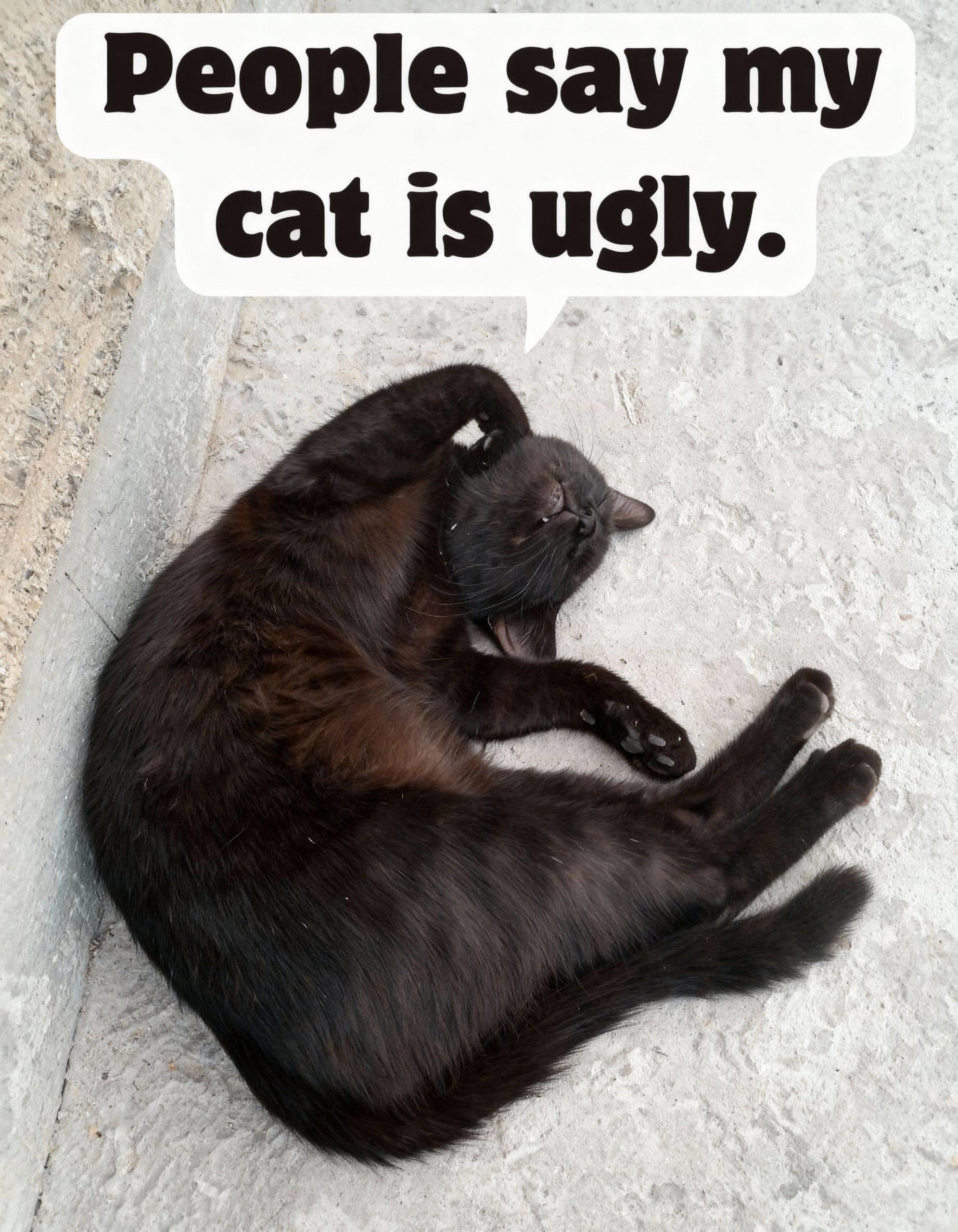In the sleepy outskirts of a sun-bleached town where cracked sidewalks baked under a relentless noon glare, a single cardboard box appeared one sweltering July morning—tucked against the chipped concrete wall of Mrs. Delgado’s abandoned bodega like an afterthought. Inside, barely visible through a flap torn by wind and time, lay a tiny black kitten no larger than a grapefruit, his fur matted with alley dust and his eyes sealed shut by infection. Passersby hurried past, noses wrinkled; a delivery driver muttered “poor thing” yet kept walking; even the local kids, usually eager for any stray adventure, crossed the street with exaggerated shudders, whispering that the creature looked “like a shadow that forgot how to be cute.” By afternoon, someone had scrawled a cruel caption on a scrap of poster board and propped it above the box: People say my cat is ugly. No one expected what happened next—no one, that is, except the quiet college student who knelt beside the box, lifted the trembling shadow into her hoodie pocket, and carried him home.

Her name was Linh Nguyen, a biology major who had grown up rescuing everything from injured sparrows to three-legged frogs. She named the kitten Mochi—not for his looks, but for the way he kneaded her palm with desperate little paws the moment warm milk touched his tongue. Veterinarians were blunt: chronic conjunctivitis had scarred his corneas, giving his eyes a perpetual squint; malnutrition had left his coat patchy and dull; and a healed fracture in his tail bent it at an odd, question-mark angle. “He’ll never be a beauty,” the vet shrugged. “But he’ll live.” Linh heard only the second part.
Weeks blurred into a routine of eyedrops, brushings, and midnight feedings. Mochi’s fur began to gleam like spilled ink under moonlight, yet the quirks remained: one ear flopped forward, the tail curled like a comma, and his meow emerged as a rusty croak that sounded suspiciously like a complaint. Neighbors peeked over the fence and smirked. “Still keeping the gargoyle?” they’d tease. Linh answered with photos—Mochi sprawled across textbooks, Mochi chasing sunbeams, Mochi asleep on her pillow with one paw draped protectively over her phone. She captioned every post the same way: People say my cat is ugly. I say he’s a masterpiece.
Then came the surprise that rewrote the block’s gossip ledger. On the first cool evening of September, Linh hosted a backyard study session for her lab group. Someone left the gate ajar. Mochi—now a sleek, mischievous teenager—slipped out and vanished. Panic spread faster than the news of free pizza. Flashlights swept alleys, treats rattled in bowls, and Linh’s voice cracked as she called his name until it echoed off every shuttered storefront. At 2:13 a.m., a text pinged from Mrs. Delgado herself—the same woman who once suggested the kitten be “relocated humanely.” Your demon cat is on my roof. Bring tuna.
The entire block converged beneath the bodega’s sagging awning. There sat Mochi, tail curled like a shepherd’s crook, calmly batting at a loose shingle while a trapped sparrow fluttered in the gutter above him. Firefighters were summoned; ladders clanged against brick; phones flashed like paparazzi bulbs. When the tiniest firefighter—a rookie named Ortiz—finally scooped Mochi into gloved hands, the cat did something no one predicted: he licked the man’s chin with a sandpaper tongue and purred so loudly the vibration traveled down the ladder. The sparrow, freed moments later, perched on Mochi’s back as if appointing him feathered bodyguard before fluttering away.

By sunrise, the photo was everywhere: Mochi mid-yawn on the firetruck’s dashboard, eyes half-closed in sleepy triumph, the crooked tail draped over Ortiz’s badge. Someone overlaid the original cruel caption—People say my cat is ugly—and added beneath it in bold: Tonight he saved a life and stole a hundred hearts. Comments flooded in from strangers who’d never met a black cat, let alone one with a question-mark tail. Local shelters reported a 40% spike in black-cat adoptions within 48 hours. Mrs. Delgado hung a new sign above the bodega door: Home of the Hero Cat—Free Coffee for Mochi’s Mom.
Linh still laughs when she recalls the vet’s prognosis. Beauty, it turns out, isn’t symmetrical ears or showroom fur; it’s the moment a creature everyone dismissed chooses courage over fear, gratitude over grudge. Mochi sleeps on her pillow every night now, one paw on her phone as if reminding the world who gets the final say. And every time a new neighbor wrinkles their nose, Linh simply smiles, snaps a photo, and waits for the next unexpected chapter—because masterpieces, she’s learned, are rarely recognized at first glance.






